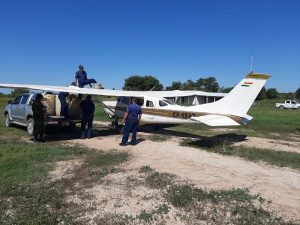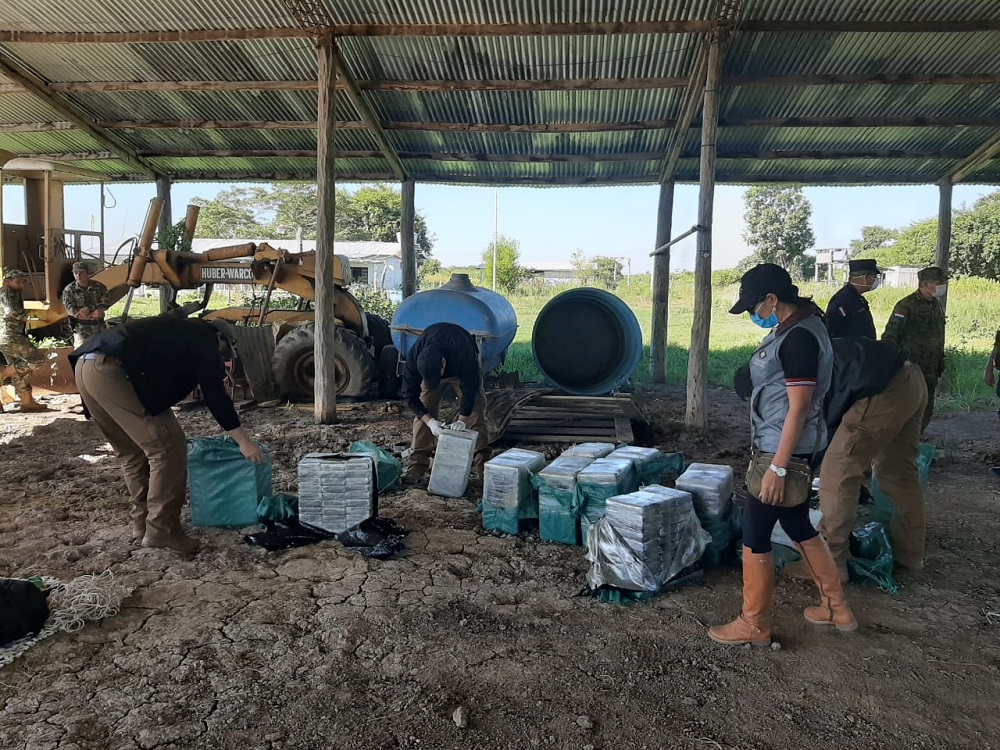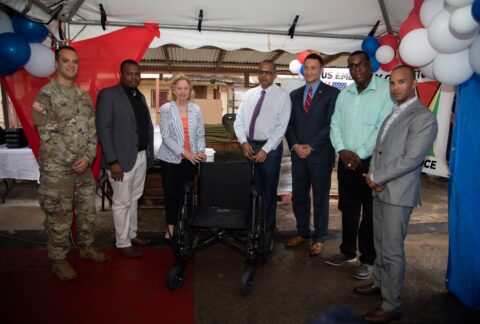On April 10, Paraguayan authorities seized a light aircraft with a Bolivian registration transporting more than 385 kilograms of cocaine on board. The Paraguayan Navy, Air Force, the Office of the Attorney General, and the National Police made the discovery in a rural establishment in the municipality of Bahía Negra, department of Alto Paraguay.
“Our fight [is] firm and relentless. We took 385 kg of cocaine out of circulation […] with a joint operation between our security forces. A strong blow to organized crime!” said Paraguayan President Mario Abdo Benítez on his official Twitter account.

According to a press release from the Paraguayan National Anti-Drug Secretariat (SENAD, in Spanish), the seizure was made on an abandoned property with a clandestine airstrip and a shed authorities believe was used to resupply light aircraft from Bolivia to Brazil. No one was arrested during the operation.
“The economic damage for organized crime was greater than $2 million,” said Arnaldo Giuzzio, head of SENAD.
Paraguay has been redoubling its efforts in the fight against organized crime. In mid-March, Air Force units and SENAD agents seized 460 kg of cocaine at a clandestine airstrip located between the departments of Concepción and Amambay, near the border with Brazil. The drug was found in a van located at an aircraft refueling point, SENAD reported. Authorities maintain that controls carried out in areas considered strategic for clandestine flights led to the vehicle being abandoned.
Only a month earlier, within the framework of Operation Sovereign Sky (Operación Cielo Soberano), SENAD disabled more than eight clandestine airstrips used to traffic Andean cocaine in the same border area with Brazil. Although the number of clandestine runways that exist in the country is unknown, it is estimated that there could be hundreds, an official with the National Directorate of Civil Aviation told Paraguayan newspaper ABC Color.
According to the U.S. Department of State’s 2020 International Narcotics Control Strategy Report, Paraguay has made significant progress in drug interdictions. In 2019, the country seized more than 4 tons of cocaine and more than 330 tons of marijuana, figures that exceeded those of 2018. Paraguay, the report indicates, serves as a transit country for cocaine coming from Bolivia. Narcotraffickers exploit the air bridge between both countries, porous borders, and extensive waterways to smuggle cocaine mainly to Brazil with Europe as a final destination.
Paraguay is also the main producer of illegal marijuana in the region, where between 5,000 and 8,000 hectares of the drug are cultivated, reports InSight Crime, an organization that specializes in security threats in Latin America. About 77 percent of the output ends up in Brazil, while 20 percent goes to Argentina, the organization says.
Narcotrafficking is one of the main manifestations of organized crime on the Tri-border area (Argentina, Brazil, Paraguay), added InSight Crime. Powerful criminal groups, such as the First Capital Command and the Red Command, both from Brazil, and even Hezbollah, vie for control of drug trafficking — in mid-August 2019, Paraguay designated the Lebanese group a terrorist organization.
The fight against organized crime is ongoing and carried out with the support of countries in the region through intelligence exchanges, combined operations, and training. For example, in November 2019, Brazil and Paraguay carried out Operation New Alliance XXI in the department of Amambay. The objective was to attack cannabis production centers, increase controls in the area, and reduce violence.
The United States also works closely with Paraguay to combat narcotrafficking and related crimes. In December 2019, Benítez met with his U.S. counterpart President Donald Trump at the White House to strengthen ties of friendship between the two countries and sign agreements to fight against organized crime.
“It’s important to mention that cooperation activities between both nations have focused on fighting transnational organized crime, providing humanitarian assistance, sharing knowledge through training, and promoting respect for human rights,” said the Paraguayan Ministry of Defense regarding the cooperation with the United States.








